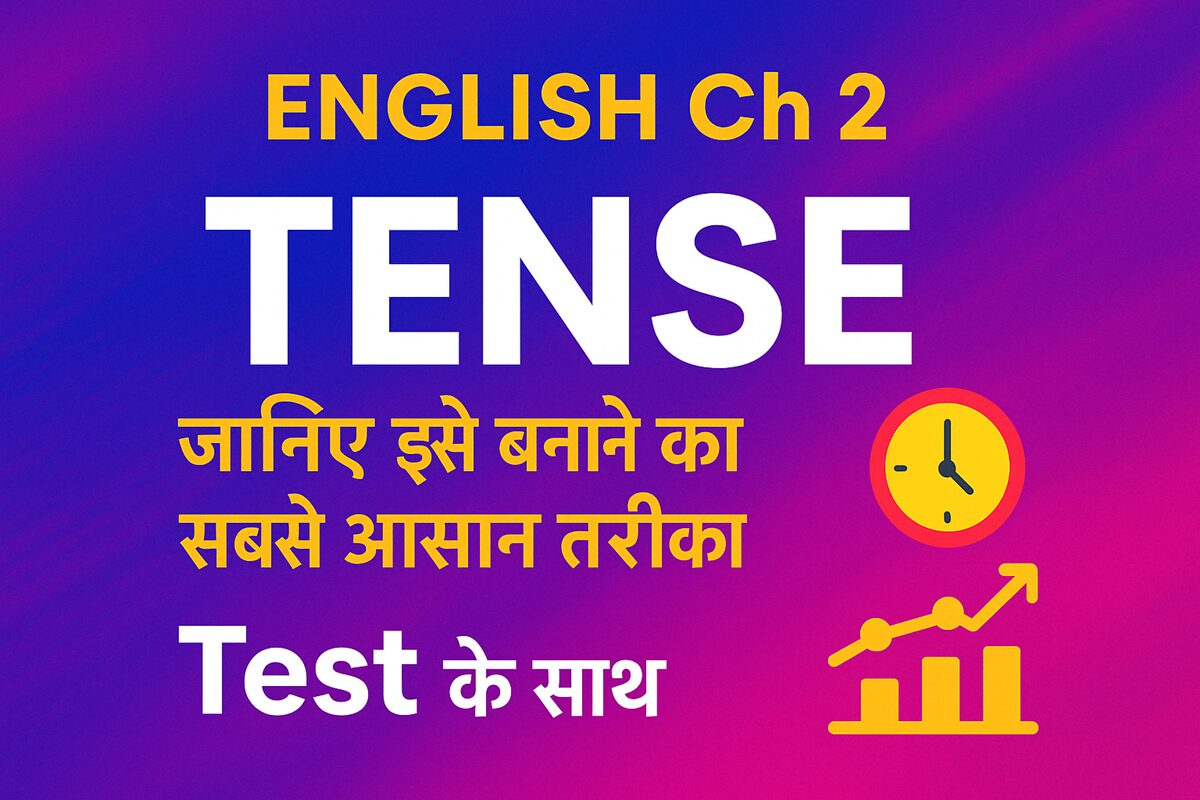Tense in English grammar refers to the time at which an action takes place. Tenses are important because they help us to describe exactly when something happens—past, present, or future. Let’s understand them in a simple, structured way with tables, key points, tricks, and examples.
✅ 1. PRESENT TENSE
(A) Simple Present
Usage: Habitual actions, general truths, regular events.
| Structure | Example |
|---|---|
| Subject + Verb (base form) | I play cricket. He writes neatly. |
- Keywords (clues): always, usually, daily, often, every day.
Trick to remember:
“Daily routines and universal facts—use Simple Present!”
(B) Present Progressive (Continuous)
Usage: Actions happening right now or temporary actions.
| Structure | Example |
|---|---|
| Subject + am/is/are + Verb + ing | She is reading a book. They are playing football. |
- Keywords: now, at the moment, currently, right now.
Trick:
“Action in progress right now—go with ‘ing’ form!”
(C) Present Perfect
Usage: Actions completed recently, or experiences without specific time.
| Structure | Example |
|---|---|
| Subject + has/have + Past Participle (V3) | I have finished my work. She has visited Mumbai. |
- Keywords: already, yet, just, ever, recently.
Trick:
“Something done, result matters now—use has/have + V3.”
✅ Quick Summary of Present Tenses:
| Tense | Form | Example |
|---|---|---|
| Simple Present | Subject + V1 | He walks. |
| Present Progressive | Subject + is/am/are + V-ing | He is walking. |
| Present Perfect | Subject + has/have + V3 | He has walked. |
📌 2. PAST TENSE
(A) Simple Past
Usage: Completed action at a specific past time.
| Structure | Example |
|---|---|
| Subject + Verb (V2) | I went to market yesterday. She wrote a letter. |
- Keywords: yesterday, last night, ago, in 2022.
Trick:
“Action finished in past, use second form (V2) fast.”
(B) Past Progressive (Continuous)
Usage: Action going on at some point in the past.
| Structure | Example |
|---|---|
| Subject + was/were + Verb + ing | He was watching TV. They were playing chess. |
- Keywords: while, at that moment, at 7 pm yesterday.
Trick:
“Past action going on, remember was/were + ing form.”
(C) Past Perfect
Usage: Action completed before another past action or time.
| Structure | Example |
|---|---|
| Subject + had + Past Participle (V3) | He had left before I arrived. They had eaten already. |
- Keywords: already, before, by the time.
Trick:
“Earlier past completed clearly—use had + V3 dearly.”
✅ Quick Summary of Past Tenses:
| Tense | Form | Example |
|---|---|---|
| Simple Past | Subject + V2 | He walked. |
| Past Progressive | Subject + was/were + V-ing | He was walking. |
| Past Perfect | Subject + had + V3 | He had walked. |
📌 3. INDICATION OF FUTURITY (Future Tense)
English doesn’t have a direct future tense form, but future actions are indicated using these forms:
| Form | Structure | Example |
|---|---|---|
| Will + V1 | Subject + will + Verb (base form) | He will go tomorrow. |
| Going to + V1 | Subject + is/am/are + going to + Verb | She is going to visit Delhi. |
| Present Progressive (future arrangements) | Subject + is/am/are + V-ing | I am meeting Rahul tonight. |
- Keywords: tomorrow, next week, soon, in future.
Trick:
“Plans fixed, meetings arranged—use Present Progressive.
Decisions now or unsure—go with Will + V1.”
📝 Important Points to Remember
- Tenses help identify the time clearly (present, past, future).
- Look at time indicators (keywords) to choose the right tense.
- Remember verb forms clearly:
- V1: Base form (eat, write)
- V2: Past form (ate, wrote)
- V3: Past participle (eaten, written)
💡 Quick Revision Table:
| Tense | Form | Keyword Examples |
|---|---|---|
| Simple Present | V1 | always, usually |
| Present Progressive | am/is/are + V-ing | now, currently |
| Present Perfect | has/have + V3 | already, just |
| Simple Past | V2 | yesterday, ago |
| Past Progressive | was/were + V-ing | while, at that time |
| Past Perfect | had + V3 | before, already |
| Future Indication | will / going to / Present Progressive | tomorrow, next |
🎯 Practice Examples
- She ___ (play) football every Sunday. (plays – Simple Present)
- They ___ (complete) the task yesterday. (completed – Simple Past)
- We ___ (go) to Shimla next month. (are going – Futurity)
🚀 Quick Tricks & Tips
Future plans → will/go to/Present Progressive
For habits, facts → Simple Present
Action happening now → Present Progressive (ing)
Action done recently → Present Perfect
Specific past time → Simple Past (V2)
Action in progress in past → Past Progressive (was/were + ing)
Action before another past action → Past Perfect (had + V3)
English Ch2: Tense प्रत्येक उत्तर के +1 पॉइंट आपको मिलेंगे और गलत उत्तर के 0 पॉइंट, START TEST का बटन दबाकर आप TEST को शुरू कर सकते हैं उत्तर सही होने पर हरा रंग का उत्तर दिखेगा गलत होने पर लाल रंग का उत्तर दिखेगा अंत में FINISH TEST का बटन दबाकर टेस्ट को समाप्त करे, और आपने कितने अंक प्राप्त किए उसे देखें

